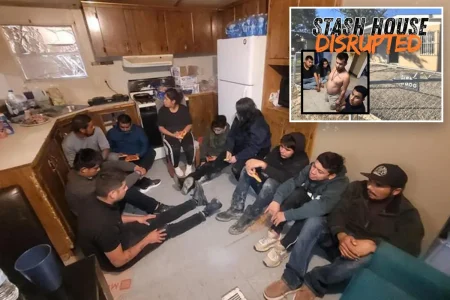Gaza Hostage Negotiations: Hopes and Hurdles as Mediators Prepare for Critical Talks in Egypt
As the sun rises over Cairo this Monday, negotiators will convene in a high-stakes diplomatic effort to broker freedom for those caught in one of the most intractable hostage situations of our time. While representatives won’t directly face each other across the table, the weight of their indirect discussions could determine the fate of dozens of lives. Mediators from Egypt, Qatar, and the United States are preparing to shuttle between Israeli and Hamas representatives in a carefully choreographed diplomatic dance. Yet despite renewed international pressure and the desperate pleas of families on both sides, significant obstacles threaten to derail any potential breakthrough in securing the release of hostages held in Gaza in exchange for Palestinian prisoners.
The Diplomatic Landscape: Key Players and Their Positions
The negotiation framework established for Monday’s talks reflects the deep complexity of the situation. Egypt, with its historical role as a regional mediator and its direct border with Gaza, provides both geographical convenience and diplomatic credibility. Qatar, meanwhile, maintains communication channels with Hamas leadership while preserving diplomatic ties with Western nations. The United States brings its considerable diplomatic weight as Israel’s closest ally, with President Biden’s administration increasingly vocal about the humanitarian imperative of securing hostage releases. “These negotiations represent perhaps the most significant opportunity in months to achieve tangible progress,” noted former U.S. diplomat Robert Malley in a recent analysis. “The indirect format acknowledges political realities while still creating space for substantive discussion.” Israeli officials have indicated their delegation will arrive with clear parameters regarding prisoner exchanges, while Hamas representatives are expected to press for guarantees concerning both the scope of Palestinian prisoner releases and broader ceasefire considerations. For the families of those held captive, these diplomatic intricacies matter far less than concrete results.
The Human Cost: Families in Anguish as Captivity Continues
Behind the geopolitical calculations and negotiating positions lies an unimaginable human toll. “Each day feels like a lifetime,” explained Sarah Cohen, whose 27-year-old brother has been held hostage since October. “We exist in a state of suspended animation, unable to grieve properly or move forward.” Psychological experts describe the unique trauma experienced by families of hostages, caught between hope and despair with each new report of potential negotiations. For Palestinian families whose relatives remain in Israeli prisons, the emotional burden carries similar weight. “My son was 19 when he was arrested,” said Fatima Nazal of Ramallah. “He has missed his youth entirely.” Medical professionals monitoring the situation have expressed grave concerns about the deteriorating physical and mental health of those held captive in Gaza, where resources are severely limited and conditions increasingly dire. Reports from humanitarian workers in the region suggest that basic medical supplies remain scarce, raising urgent questions about the wellbeing of hostages, particularly those with pre-existing conditions. As negotiations proceed, these human stories represent the true stakes of success or failure.
Stumbling Blocks: Why Previous Negotiations Failed
The path to Monday’s talks is littered with the remnants of previous failed negotiations, each offering cautionary lessons. The most significant attempt at a hostage exchange deal collapsed in May after three days of seemingly promising discussions. Negotiators familiar with those talks point to several persistent challenges that remain relevant to the current round. First is the fundamental question of proportionality – how many Palestinian prisoners should be released in exchange for each Israeli hostage, and which categories of prisoners would be eligible. Previous talks stalled when Hamas insisted on the release of prisoners serving life sentences for attacks that resulted in Israeli casualties, a demand Israeli negotiators found politically impossible to accept. Second is the sequencing of any releases, with each side deeply distrustful of the other’s commitment to fulfilling later phases of an agreement. “Trust is nonexistent,” explained Ibrahim Kalin, a regional analyst. “Every detail must be guaranteed by the mediators because neither party believes the other will follow through without verification.” A third challenge involves the broader context of the conflict, with Hamas previously linking hostage releases to more comprehensive ceasefire arrangements. Israeli officials have insisted on separating these issues, arguing that hostage releases should proceed regardless of wider political considerations. These unresolved tensions have derailed previous talks and threaten to do the same again.
The Regional Context: How Wider Middle East Dynamics Impact the Negotiations
The hostage negotiations unfold against a volatile regional backdrop that both complicates the immediate talks and raises the stakes for all involved. Recent developments along the Israel-Lebanon border have heightened tensions, with escalating exchanges of fire between Israeli forces and Hezbollah fighters creating what United Nations officials describe as “a dangerous parallel crisis.” Intelligence analysts warn that failure to achieve progress on the hostage issue could trigger wider regional instability. “There’s a growing recognition among all parties that the status quo is unsustainable,” explained Dr. Nadia Hijab, director of a Middle East policy institute. “The question is whether that shared assessment can translate into the compromises necessary for an agreement.” Regional powers including Egypt, Jordan, and Saudi Arabia have intensified diplomatic efforts in recent weeks, recognizing that a successful hostage exchange could represent a rare moment of de-escalation. Iranian influence remains a significant factor, with Tehran’s relationship with Hamas potentially serving as either facilitator or obstacle depending on its strategic calculations. For ordinary citizens across the region, the prospect of expanded conflict looms large if diplomatic efforts fail. “People are exhausted by perpetual crisis,” noted humanitarian worker Kareem Bakri. “A hostage agreement would represent not just freedom for those directly involved, but a glimmer of hope that diplomacy can still function in this region.”
The Road Ahead: Prospects for Breakthrough and Contingency Plans
As mediators prepare their briefing materials for Monday, realistic assessments of potential outcomes vary widely among diplomatic observers. The most optimistic scenario envisions a phased agreement beginning with the release of civilian hostages and expanding to include military personnel in subsequent stages. Corresponding releases of Palestinian prisoners would likely begin with those serving shorter sentences for non-violent offenses. However, contingency planning is also underway should talks fail to produce immediate results. Humanitarian organizations are continuing to press for medical access to hostages regardless of political agreements, while families on both sides are mobilizing international opinion to maintain pressure on decision-makers. “Monday’s talks represent an important opportunity, but not the final one,” emphasized UN Special Representative Johanna Westeson. “The international community must be prepared to support continuing efforts regardless of initial outcomes.” Security analysts note that the passage of time typically complicates hostage situations, with captors becoming more entrenched in their positions and the physical conditions of those held captive deteriorating. This reality adds urgency to the current negotiations. For the mediators shuttling between conference rooms in Cairo, the challenge is to identify creative solutions that allow both sides to claim sufficient victory while accepting necessary compromises. “Successful mediation in this context isn’t about finding perfect justice,” noted veteran negotiator Daniel Levy. “It’s about finding arrangements both sides can live with, even if reluctantly.”
Beyond the Immediate Crisis: Building Pathways to Sustainable Resolution
While Monday’s talks focus specifically on hostage exchanges, the broader context cannot be ignored if any agreement is to hold. Humanitarian conditions in Gaza remain catastrophic, with international aid organizations reporting critical shortages of food, medicine, and clean water. Economic reconstruction, whenever it becomes possible, will require years of concentrated effort and international support. Security arrangements to prevent future hostage-taking while addressing Palestinian grievances remain conceptually undeveloped. “Any hostage deal, while critically important, only addresses the most immediate symptom of a much deeper conflict,” observed peace studies professor Helena Cobban. “The challenge for diplomats is to use any successful agreement as a foundation for addressing underlying causes.” Some diplomacy experts suggest that the very process of negotiating a hostage exchange, regardless of initial scope, could establish working relationships and procedural mechanisms that facilitate future discussions on more fundamental issues. Others remain skeptical, pointing to decades of failed peace initiatives. What remains undeniable is the moral imperative to secure freedom for those held captive and to alleviate the suffering of their families. As negotiators gather in Cairo, they carry this responsibility alongside their briefing books and talking points. The world watches with cautious hope that this time, somehow, humanity might prevail over hostility.











